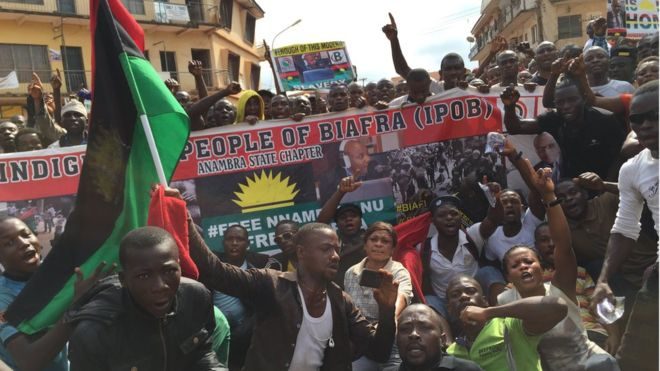A Federal High Court in Abuja has dismissed an application challenging the designation of Indigenous People of Biafra (IPOB) as a terrorist organisation.
Ruling on the matter, acting Chief Judge, Justice Adamu Abdul-Kafarati, on Thursday, said the application was unmeritorious and it was accordingly dismissed.
Justice Abdul-Kafarati awarded N500,000 as fine against IPOB.
The judge had, on September 20, 2017 made an ex parte order declaring IPOB as a terrorist organisation.
The application filed by Ifeanyi Ejiofor, on behalf of IPOB, had also challenged the proscription of the group by the Federal Government.
Miffed by the order, IPOB through its lawyer, Ifeanyi Ejiofor, filed a motion on notice dated September 21, 2017, to seek the setting aside of the order of injunction made on September 20, in the suit marked FHC/ABJ/CS/871/17.
The application was brought pursuant to section 6(6)(1)(4) of the constitution.
In its ruling, the court further held that the argument of Ejiofor that President Muhammadu Buhari did not sign the memo to designate IPOB a terrorist organisation could not stand.
Ejiofor had posited that the letter written by the Attorney General of the Federation to the president did not amount to approval to tag IPOB as a terrorist group.
He also stated that the letter signed by the Chief of Staff to the President, Abba Kyari, which conveyed the approval as the duty of the president under section 40 of the Act could not be delegated.
In addition, the IPOB argued that the Terrorism Act is explicit and specific on who can give approval for an organisation to be proscribed.
According to Ejiofor, President Buhari who the Act specifically empowered to approve the proscription order did not give his approval as required under the law.
“The order of the court did not comply with the processes of section 40 of the Terrorism Act, which defined the office of the president and all actions that are to be taken by him under the act.”
He added that in the instant case, no approval was given by the president.
In view of the contention of IPOB’s lawyer, Justice Abdul-Kafarati said, in accordance with section 2(1a) of the Terrorism Prevention (Prohibition) Act 2011, the Attorney General of the Federation and Minister of Justice was saddled with the implementation of issues relating to terrorism.
The court noted that a memo in that regard was transmitted by the AGF to the presidency before a court order was secured in order to give the designation and proscription of IPOB legal backing.
In upholding the ex parte order he granted on September 20, 2017, Justice Abdul-Kafarati noted that section 45 of the 1999 constitution of the Federal Republic of Nigeria, as altered, states that nothing in sections 37, 38, 39 and 41 of the constitution shall invalidate any law that was reasonably justifiable in a democratic society.
On Ejiofor’s question on whether IPOB, being an organisation registered abroad and not in Nigeria, can be proscribed, the court answered “yes” in favour of the Federal Government.
He said IPOB operated in Nigeria and its members were Nigerians.
Moving the application, Ejiofor had urged the court to vacate the order on the grounds that the process followed in obtaining it was defective.
Ejiofor said that IPOB was registered in England, India, and several other countries and that her members had the right for self-determination under the United Nations Charter.
The applicant also said that IPOB never engaged in any terrorist activities, adding that procession and rallies which the organisation engaged in were not terrorist acts.
In opposition, Solicitor General of the Federation, Dayo Apata, who represented the Federal Government, said the ex parte order was secured “in the interest of justice, public peace, constitutional order, territorial integrity, and national security.”
Apata argued that Nnamdi Kanu, leader of the proscribed IPOB, had called Nigeria a ‘zoo that must be scattered’.
He said that a less, but similar incident, fuelled the Rwandan genocide.
Consequently, the SGF said the application should be refused because IPOB engaged in terrorism activities.




